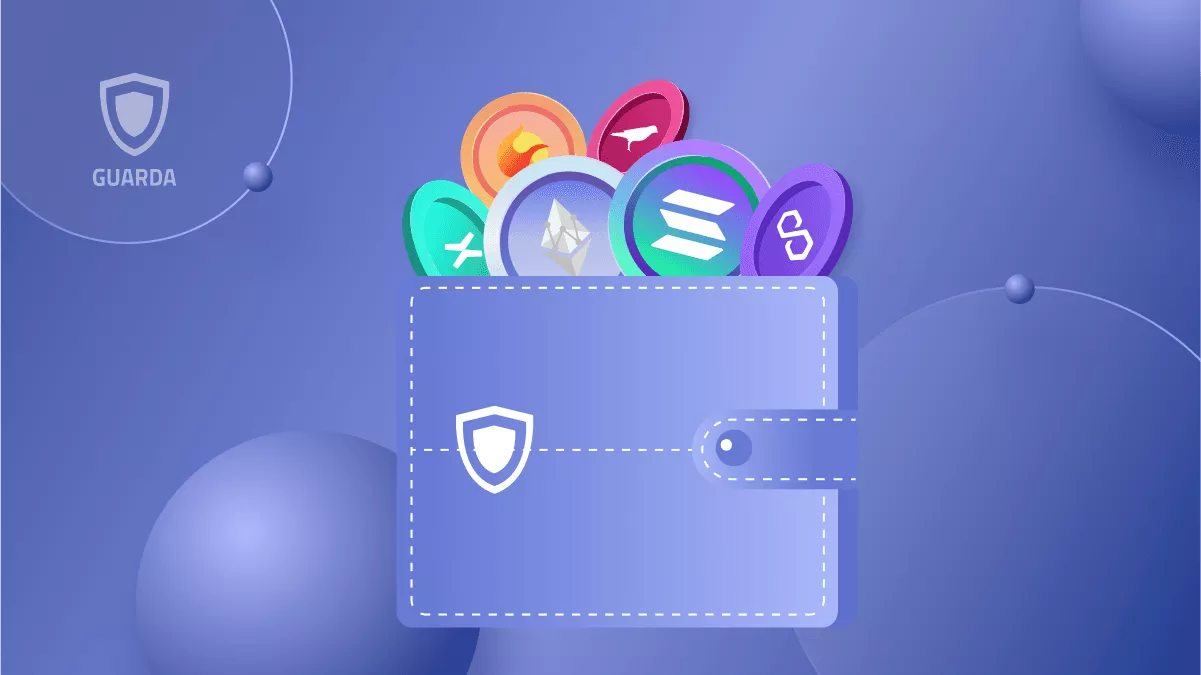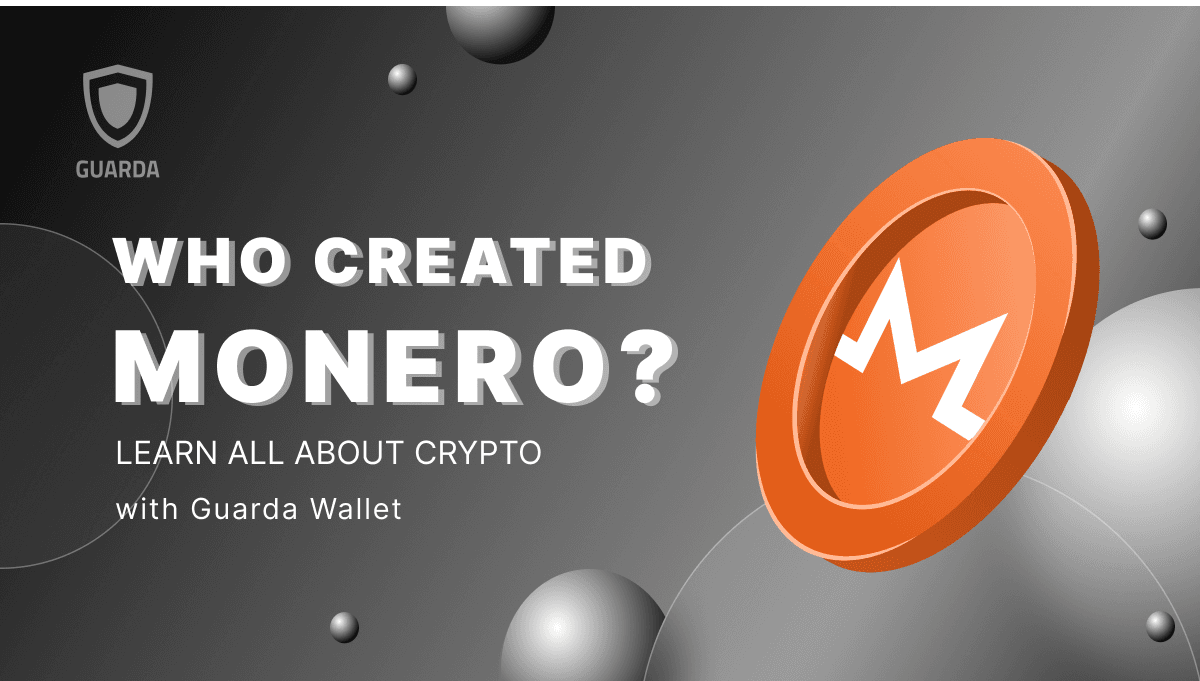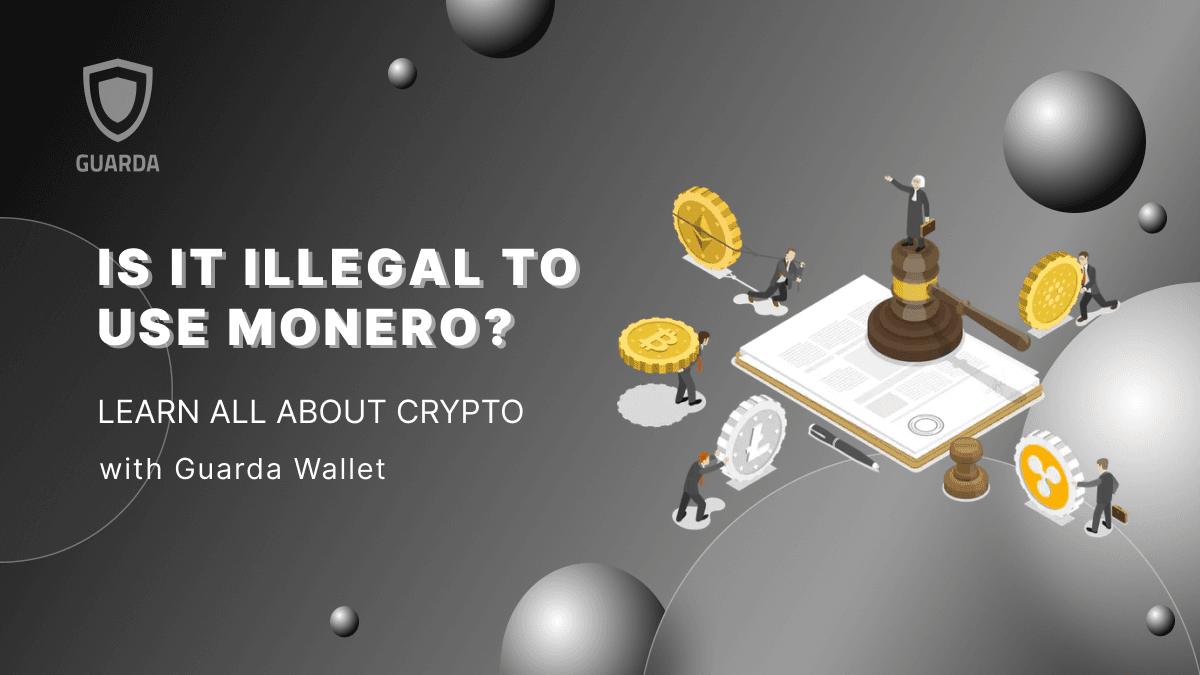What are Crypto Wallets?
A crypto wallet holds all the essential data you demand to get to money on the blockchain. Maintaining it well ensures the safety of your digital coins, even though they’re actually stored on the secure, transaction-tracking blockchain, not within the wallet itself.
A wallet has two main parts: a private key and a public key. Consider that the public key is like your mailbox address anyone can see. They can send youletters (or in our context, crypto) using it. But just like someone knowing your mailbox doesn’t mean they can walk into your house, having your public key doesn’t let them access crypto stash. That’s what the private key is for it saves a wallet locked up tight.
Let’s explore the space of crypto wallets and get to know what crypto wallets are, how crypto wallets work, what types of crypto wallets are there, and why to use a crypto wallet. Moreover, we’ll follow the process on how to create one with Guarda decentralized platform offering a friendly interface to set up Bitcoin wallet, Ethereum wallet, Solana wallet, and more.
How Crypto Wallets Work?
Getting a grip on how crypto wallets work is key for anyone into crypto. Consider a public key as the address plaque on your residence, inviting others to deliver crypto directly to you. Conversely, the private key operates as a discreet passcode, empowering you to do transactions. It acts as the key to your exclusive digital vault, demanding utmost safeguarding.
How to store cryptocurrency?
Special software is often required to work with cryptos. Wallet apps let you work with the chain, so you can send or receive cryptos to and from your wallet address.
Types of Crypto Wallets
There’s a world of crypto wallets out there. From online wallets letting you swap on the go, to hardware wallets that are like secure vaults for your digital dough. Paper wallets provide a low-tech, hacker-proof option, while software wallets keep things handy on a device.
Let’s have a detailed look at the types of crypto wallets:
Custodial wallets:
These are like having a safety deposit box the bank holds the key to. Digital keys are stored on someone else’s server (like Coinbase or BitFinex). It’s handy because you can go into account from anywhere, but since the keys are with someone else, there’s a higher chance of hacks.
- Exchanges: Platforms where keys are made and kept by the organization or someone else. Super convenient but watch out for safety risks.
- Wallets: Some companies make the keys and keep them safe (like Freewallet).
Non-Custodial wallets:
Think of these as a secure digital place only you hold the keys to. You’re in complete head, meaning better safety and that you’ve got access to keys.
- Software Wallets: Can live on your mobile or computer. You download them directly, so they’re always with you.
- Web Wallets: Super popular as they’re easy to use for trading and managing your coins online, but they demand security research.
- Desktop Wallets: Programs you download to a computer, giving you full control over your crypto stash.
- Mobile Wallets: Perfect for those who wish their crypto handy for everyday spending. Their popularity is booming as more places start accepting cryptos.
- Paper Wallets: One of the safest storage systems. You print out your keys and keep them offline.
- Hardware Wallets: Like a USB stick for crypto, keeping funds offline. Some well-known ones include Ledger Nano S and Trezor Model T.
Whether you’re dipping your toes into trading or just curious, the best wallet opens up a world of possibilities. From online wallets for swift access to secure hardware wallets for peace of mind, finding the one match is key to successful crypto adventure.
Guarda decentralized non-custodial wallet (https://guarda.com/) combines all the types of crypto wallets together. Guarda opens the best crypto wallet spaces, offering a smooth process of managing, buying, exchanging, and securing assets in one spot. Whether you’re aiming to safeguard your digital assets in Bitcoin wallet, Ethereum wallet, Solana wallet, and more, make swift swaps, or explore the vast crypto landscape, Guarda’s here to make it straightforward and secure.
How to Create a Crypto Wallet?
Creating a crypto wallet is your first step into the blockchain universe. Go to the website, find the Sign in button or access the platform from the device that’s suitable for you, and follow simple steps. It’s easy to create a crypto wallet with Guarda and start the journey.
Custodial vs Non-Custodial wallet
In a non-custodial wallet, it’s like you’ve got the only set of keys to your digital treasure chest. You’re the head, with no one else able to peek inside or make moves with your crypto. But remember, being the boss means all the responsibility is on you.
Contrariwise, custodial wallets are like leaving your crypto keys with a trusted friend. They keep your cryptos safe and can even help you out if you lose access. You have to trust them not to snoop around or give the keys to someone else, which is risky.
How To Use Crypto Wallets?
To make a cryptocurrency wallet work for you, you’ll need 2 vital things:
- A public key: This is like your crypto mailbox address where people can send you funds.
- A private key: Think of this as the secret password that lets you unlock your mailbox and send your own crypto flying out to others. You sign off on transactions with this key, and as the chain gives the nod, the transaction is done.
So, whether you’re sending or receiving digital coins, these keys are your in and out of the crypto world.
Crypto Wallet for Beginners: Step-by-Step Guide
For newcomers, choosing the best one can be daunting. Start by identifying needs — whether it’s making quick transactions, engaging in DeFi, or simply holding cryptocurrencies. Starting is as simple as picking one that feels right for you.
Best Crypto Wallets
The best crypto wallets strike the perfect balance among simplicity, security, and nifty features. Whether you prefer the fortress-like security of a hardware wallet or the convenience of a mobile app, there’s a wallet out there for you.
How to Сhoose a Сrypto Wallet?
Finding the best wallet is all about how you plan to use your digital currency. Here’s a quick guide to help you make the best choice:
- What’s Your Goal? The way you plan to use your crypto shapes the choice. For daily spending, a mobile wallet fits perfectly.
- User-Friendliness: Ease matters, especially for newcomers. Opt for an easy-setup wallet. Seasoned users, look for advanced features.
- Security Matters: Prioritize safety. Check if it has extra protections like two-factor authentication and offline key storage. Don’t forget to research its security track record.
- Your Crypto Variety: Single or multiple cryptocurrencies? Pick the one that supports all your digital currencies.
- Stay Updated: Investigate the provider. Good signs include positive user feedback and regular software updates.
FAQ
What are Crypto Wallets?
Consider a crypto wallet not as a physical, but as a virtual keychain holding the keys to the digital valuables. It’s basically your access point to the blockchain, where all the crypto action happens. Inside, you’ll find two important things: a public key and a private key.
What is a Wallet Address?
Envision your wallet address as your exclusive crypto signature, a tailored sequence of letters and numbers that invites others to dispatch digital currency your way. It parallels a crypto-specific postal code — visible to the public, yet fortified with security.
How to Set Up a Crypto Wallet?
Setting up a crypto wallet ready involves picking the type you like best (could be an app, a physical device, or an online service), installing any needed software, and going through the setup steps.
Why Use a Crypto Wallet?
Simply put, a crypto wallet is a ticket to securely buying, storing, and using crypto. Using it is important for anyone looking to interact with cryptocurrencies securely and efficiently.
Please note: The insights provided in this piece are intended purely for educational exploration and should not be taken as investment guidance. Always perform personal due diligence or seek advice from a financial expert when navigating the crypto wallet landscape.



